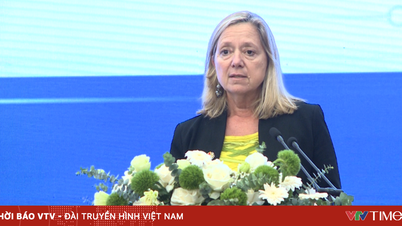Transactions through notary office
According to experts, home buyers, especially those buying future homes, are currently exposed to many risks and are easily deceived. First, the quality of the home may not be as good as advertised. Another risk is that home buyers do not receive the pink book on time. According to the law, after 3 months of handing over the house, the investor must issue the pink book to the customer. In reality, if you are lucky, the pink book will be available after 3 years, but many projects have not had one for decades. Another risk is that the investor builds the wrong design, even mortgages the customer's pink book to the bank. When they cannot repay the debt, the bank seizes the house, and the buyer only finds out. Therefore, there should be regulations to protect customers buying homes in the future.
There is currently a regulation that banks guarantee for buyers of future housing. Accordingly, if the investor does not hand over the house, the bank will compensate the customer. But most investors ignore this. Therefore, bank guarantees need to be reconsidered. Countries around the world do not require it but allow the option of guarantee or liability insurance for investors from the insurance company. In addition, when investors sell houses, they are required to transfer the customer's advance payment to a blocked account. Only when the house is handed over can the investor withdraw this money. It is necessary to change the financial capacity of investors, which is currently very low and inadequate. This leads to businesses not having the capacity to mobilize capital from many different sources.

People carry out real estate transaction procedures at Notary Office No. 3
Associate Professor - Dr. Nguyen Ngoc Dien, University of Economics and Law (Ho Chi Minh City National University), said that real estate is a valuable asset and always attracts people's attention. Transactions related to real estate always face the risk of insecurity, falsified documents, many disputes and losses between parties, so a strict legal regime is needed.
To ensure safety, in developed countries, transactions are carried out by notary services through understanding the legal status of real estate, ensuring safe transactions, avoiding damage, insurance for notary services, closely linked to the legal system, following the audit supply chain performed by notaries.
In Vietnam, according to Associate Professor - Dr. Nguyen Ngoc Dien, implementing the current notary service model is the most optimal and reasonable solution. In the coming time, it is necessary to focus on perfecting this model more closely, building legal corridors connecting the stages, increasing authenticity, verification, ensuring the highest safety for all parties like the models being applied by advanced countries.
Remove mandatory trading regulations
Dr. Luu Quoc Thai, Lecturer at Ho Chi Minh City University of Law, said that to ensure safety, transparency and control over the use of advance payments, payments in the purchase and sale of future housing must be made through banks. This measure can replace bank guarantees if the investor is required to transfer the entire advance payment into an escrow account. The money will only be disbursed according to the investor's project progress. This solution will also help reduce costs due to bank guarantees and minimize "unclear" transactions for the purpose of money laundering in real estate business transactions.
Meanwhile, according to Professor - Dr. Dang Hung Vo, former Deputy Minister of Natural Resources and Environment , currently for the sale of future housing (without pink book), investors sell through brokerage floors. For real estate with pink book, all transactions must go through a notary office.
Notaries are authorized by the State to provide public services, are a judicial title, and play the role of "gatekeeper", guiding the parties to transactions in accordance with regulations, ensuring legality and safety. As for trading floors, which are private services, it is difficult to have administrative and state management tools to ensure legality, leading to disputes and risks for both buyers and sellers. "We must legalize how the law comes into life, not mechanically applying transactions through the floor. Therefore, regulations on real estate transactions through the floor need to be removed from the draft Law on Real Estate Business (amended)", said Professor Dang Hung Vo.

Real estate transactions should not be required to go through the floor.
According to notary Hoang Manh Thang, Head of Notary Office No. 7 (HCMC), the current notary system and real estate trading floors are different in nature, scale, service products, procedures... Notarization is a public service organized by the state, a management and regulation tool of the state, a defense mechanism, with legal value, evidentiary value, and circulation value. Meanwhile, private real estate trading floors serve real estate transactions, are single-scale, depend on real estate businesses, are mainly oral agreements or transaction documents that can easily lead to serious economic and legal consequences, disputes, fraud...
The most worrying thing is that brokers at the trading floor may conceal information related to unfavorable legal matters or advertise in an unbiased manner. When disputes arise, products are defective or delayed, who is responsible? Transactions through the trading floor do not have a mechanism to ensure legal safety and transaction security. Therefore, it cannot be included in the draft Law on Real Estate Business (amended) to be submitted in the near future.
Most people disagree with the regulation that requires real estate transactions to go through the floor because currently the floors do not have the capacity to confirm the legality of the transaction. This regulation is ineffective and should be removed.
Quick view at 12 noon on June 16: Panoramic news bulletin
Source link







![[Photo] Binh Trieu 1 Bridge has been completed, raised by 1.1m, and will open to traffic at the end of November.](https://vphoto.vietnam.vn/thumb/1200x675/vietnam/resource/IMAGE/2025/10/2/a6549e2a3b5848a1ba76a1ded6141fae)






























































































Comment (0)